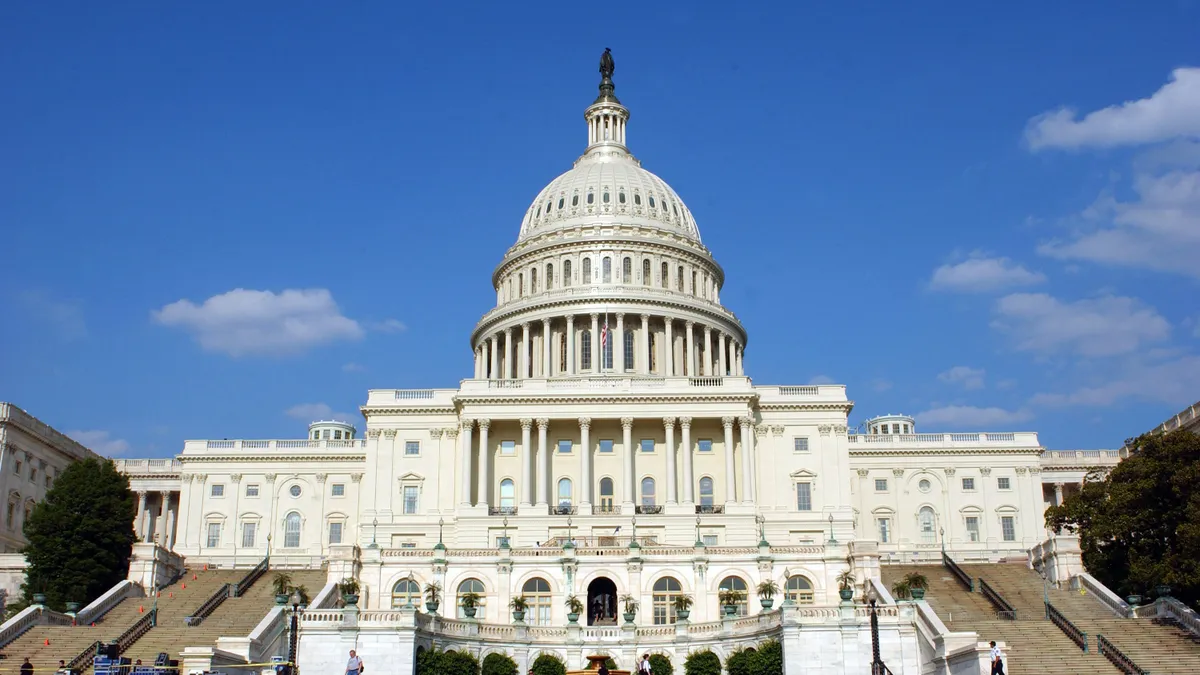Dive Brief:
- The House and Senate voted late last week to pass a stopgap bill to extend funding, averting a government shutdown. However, the legislation did not stave off Medicare reimbursement cuts for nearly 600 laboratory tests slated to take effect in January.
- The American Clinical Laboratory Association, representing Labcorp and Quest Diagnostics, last week joined 27 health organizations in sending a letter to congressional leaders warning that the "harmful" cuts — 15% for some of the most frequently ordered clinical laboratory tests — would negatively impact lab services that are "essential to the health and wellbeing" of millions of Americans who have chronic diseases, particularly seniors. The reductions in reimbursement will limit the types of tests providers can offer, they contend.
- Congress this year delayed the implementation of cuts to the Medicare Clinical Laboratory Fee Schedule (CLFS) as part of the Coronavirus Aid, Relief, and Economic Security Act. ACLA, AdvaMedDx, the American Hospital Association and other groups now want lawmakers to extend the one-year delay to the impending 2022 cuts. Cowen analysts in a Monday note said they remain "cautiously optimistic" that a fix can be added to one of the remaining legislative packages later this month or early next year.
Dive Insight:
ACLA has been fighting for years against the "flawed" implementation of the Protecting Access to Medicare Act of 2014, which sets laboratory payment rates according to market data reported by industry, both in the courts and in the halls of Congress.
CMS contends that the rate cuts better reflect market pricing data, saying on its website that beginning in January 2018, payments for "most tests equals the weighted median of private payor rates."
The trade group argues that since 2018, PAMA has resulted in three years of 10% annual cuts to many of the most commonly ordered clinical lab tests, including the top 25 most used by seniors. These Medicare cuts have forced labs serving nursing homes, skilled nursing and long-term care facilities to significantly reduce services, stop operations or lay off staff, according to ACLA.
"PAMA cuts have had a detrimental impact on clinical laboratory infrastructure, particularly labs who serve rural and underserved communities," ACLA and the health organizations wrote in their letter to House and Senate leaders. "As supplies and labor costs continue to grow, laboratories struggle to maintain and hire essential personnel. Further cuts will continue to damage the nation's laboratory infrastructure at a time when it is needed most."
The ACLA-led coalition wants to see another delay to the 2022 cuts, when rates are scheduled to reduce by 15% for certain tests used to diagnose chronic diseases such as heart disease, diabetes and cancer, among other conditions.
Congress has twice over the past two years come to the rescue — by passing the Laboratory Access for Beneficiaries Act in 2019 and the CARES Act in 2020. However, without an additional delay, ACLA and other groups argue that Medicare patients could potentially lose access to critical lab testing, including more than 56 million seniors.
"We urge you to include a one-year delay to the 2022 Medicare CLFS cuts ... in the year-end package that is currently being negotiated," Thursday's letter stated.
However, the stopgap bill passed by the House and Senate late Thursday and signed into law by President Joe Biden on Friday did not include the legislative reprieve.
While the passage of a stopgap spending bill last week removes one potential vehicle for fixing Medicare cuts scheduled to kick in on Jan. 1, Cowen analysts wrote that they remain cautiously optimistic that a legislative fix can be completed later this year or early next year.
"Potential vehicles include: 1) Debt Ceiling; 2) Build Back Better (reconciliation); 3) NDAA; 4) Stand-alone extenders package. A retroactive fix is possible if any of the aforementioned bills slip to January," according to the analysts.
Congress must take immediate action to delay the cuts by Dec. 31, warned Tom Sparkman, ACLA's senior vice president of government affairs and policy, who welcomed any measure that would do so including an end-of-year legislative package like the continuing resolution. To do otherwise, Sparkman said would "send the absolute wrong message about how we prioritize protecting seniors' health amid an ongoing pandemic."
Sparkman told MedTech Dive that the lab lobby "isn't looking to do this every year" as it continues to work with Congress on finding a "long-term, sustainable fix so that ultimately the Clinical Laboratory Fee Schedule operates as originally intended by PAMA."
ACLA wants to see a fee schedule that "follows the private market with representative data from all the laboratory segments" that serve Medicare beneficiaries, according to Sparkman. The group contends that HHS has diverged from PAMA directives by exempting significant categories of labs from reporting, resulting in Medicare rates that are not consistent with market-based rates.
"We think the way to get there is to move to a statistical sampling model where each laboratory segment, independent hospital or physician office labs are sampled and ultimately produce representative data for each code," Sparkman said.
The PAMA requirement to report private payer data will soon apply to many hospitals with outreach laboratories, which will be required to report their private payer laboratory prices and volumes. Hospitals that received at least $12,500 in Medicare revenues from CLFS services, billed on the CMS 1450 14X bill type from Jan. 1 through June 30, 2019, will be required to report on these data between January and March of 2022.
The letter that ACLA, AHA and other groups sent to congressional leaders urged lawmakers to include in their end-of-year legislative package a one-year delay to the private payer data reporting period that takes effect next month. Cowen analysts in their Monday note said that such a one-year reprieve is likely.













